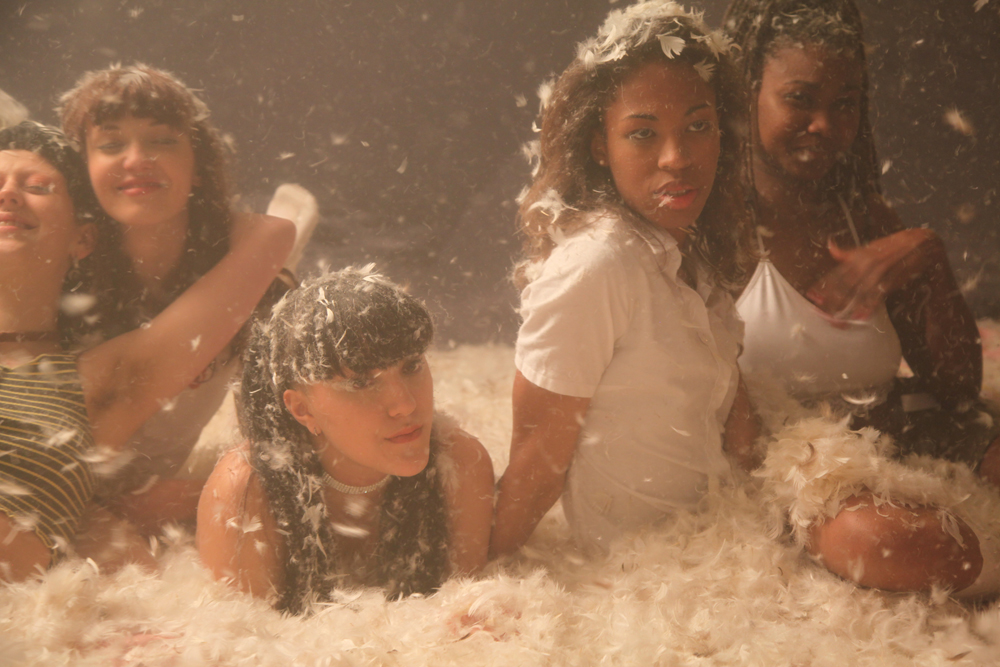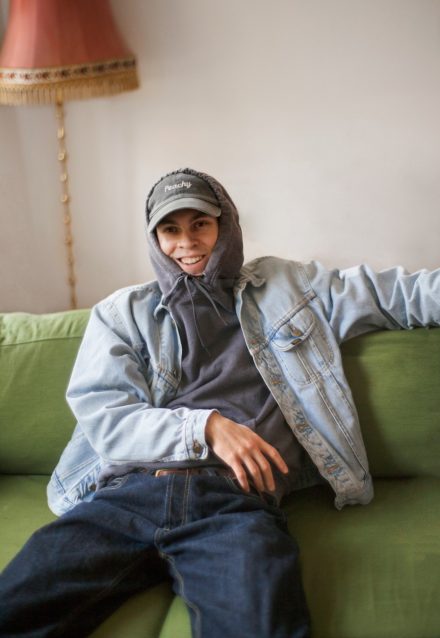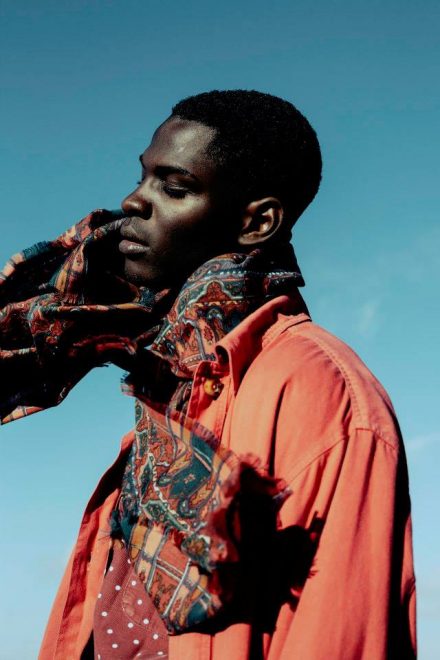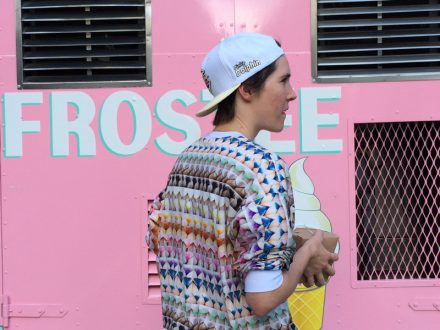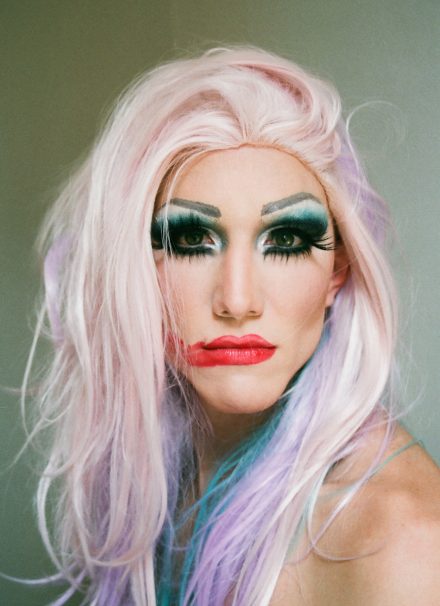Cult adult film director and photographer Bruce LaBruce, a name synonymous with the ‘New Queer Cinema’ movement of the late 80s and early 90s, presented his latest production The Misandrists at this year’s Berlinale film festival. In it, he depicts a group of lesbian terrorists, whose hatred for men fuels their mission to overthrow the patriarchy. While they’re at it, they produce homemade lesbian pornography in an attempt to broaden their audience and entice new recruits to their female-led revolution. As you might have deduced, issues concerning contemporary gender politics and sexuality lie at the core of the Canadian filmmaker’s work, enhanced by the pornographic spin for which he has won great acclaim. But what sets this new release apart is its setting within a feminist utopia, allowing for an inquisition, profound and light-hearted in equal measure, into what heteropatriarchal oppression really means.
In the lead is New York City native Kita Updike, who we met during her visit to Berlin for a chat about her latest role. All the better for us, fellow cast member Til Schindler, the film’s only male role, spontaneously tagged along to join our discussion on what feminism means today, lesbian pornography and the contemporary status of trans women.
For those that haven’t had the chance to see the movie, could you perhaps give us an overview of what The Misandrists is about?
Kita: The Misandrists is about a radical lesbian sect of girls in the German countryside. Without giving away too much, it’s kind of the sister film to Bruce’s The Raspberry Reich. One character, ‘Big Mother’ passes her knowledge and ideology onto this younger generation of wayward girls, girls that live at the edge of society. Knowing that their minds are easy to mould, she begins shaping and preparing them for the revolution she so strongly believes in.
Til: It’s a feminist film and it’s also a satirical critique of ideological feminism, which is a thin line and some people don’t really get that.
So what are your storylines?
Til: A young leftist boy comes to the school, Kita’s character finds him and hides him in the basement, where no boys are allowed. It’s down there that some truly crazy things happen and other secrets come to the surface.
Kita: Yeah, the love story between mine and Til’s characters is one of the movie’s driving storylines.
With this film, it seems that Bruce LaBruce wants to expose the longstanding oppression to which women have been subjected, and the sect in the film makes a very clear statement on the topic. How is the radical feminism of the film acted out?
Kita: The whole story is more like an arc of tension, building up to the point where they really act it out. What you see is the process by which these young minds are moulded, through lesbian propaganda and pornography; the girls are brainwashed into praising “the cunt”. We become ‘Big Mother’’s primary vehicles in forcing people to join her revolution. Since the movie is set in the middle of nowhere, somewhere in the German countryside, 90% of the film is spent with the characters interacting with one another, so the radical feminism is primarily depicted through the pornography and mantras employed.
Why spread the message through homemade lesbian pornography?
Kita: It’s a way to champion women’s bodies, to rid us of our shame, which has been a key tool of patriarchal oppression turning things like having your period or the word “pussy” into signs of weakness. It’s a way of showing the beauty of a woman’s body by interacting with it. But it takes on a radical edge, as it says: “We are going to show you this beauty and we are going to make you think it’s beautiful, by force.”
Kita: Porn teaches women to feel shame, to be subservient and to accept being used like toys. This lesbian porn gives them power, and I guess that is the point. But also the school needs the money! (laughs)
So what does feminism mean to you?
Kita: As a trans woman, I have a very specific relation to feminism. For me, being a feminist means fighting to be equal to men, for the ability to reside in a world where we all have equal opportunities. When we talk about gay rights or other issues in this day and age, a lot of them can be tied back to women’s rights. I’ve heard some interesting perspectives, especially when it comes to trans women; people have said: ‘You are giving up your rights as a man!’ But I never had those rights, I was always feminine. Feminism is the fight for equality, for fair treatment all across the world, for the ability for anyone to walk out of the house and not to be seen as less just because they are not a white cisgendered male. It’s very simple to me: it is a matter of equality across the board.
Til: I think that everybody should be a feminist. Feminism means fighting for equality, no matter your sex or gender. We live in a patriarchal world where women are oppressed across the board and are kept from enjoying equal opportunities and rights. That’s what we should be fighting for.
Where do you think the LGBTQ community stands in relation to feminism? Would you say that they are victims of the same oppression?
Kita: For me, it’s all falls under the same roof, it’s all the same fight.
Til: As Kita said, these are fights should be fought together. Much sexism and homophobia is rooted in a rejection of femininity, and so they should go hand in hand.
Besides feminism and lesbian propaganda, what other topics are touched upon in the movie?
Kita: Being transgender; it’s a topic on many people’s minds right now, especially in America, and is something that many may not have thought about before. With the public coming out of people like Caitlyn Jenner, even older people are now are thinking about it. I just want to be able to walk among people without being stared at, to be a woman just as my mother and my sister are. I didn’t come this far to be pointed at everyday. The great thing about this movie is that it doesn’t focus on my character’s being trans, but rather on the story of a girl who is part of this feminist sect, just trying to figure out why she is not as physically devoted as the rest of these girls. It just happens to be part of her: she is a black woman, she is taller, and her being trans is just another characteristic. She has more to offer than simply being a trans women and I think that is truly important.
Which social topics concern you the most?
Kita: It has to be women’s equality of course. Even though I was born male, I never really had the advantages of being male. I stand here fighting as a transgender woman in the hope that it will be easier for all young girls in the future. I missed out on a lot of things in my developmental stages, I missed out on being a young girl, on having a childhood, because people didn’t want to have anything to do with me, people didn’t want to talk to me, people didn’t want to be my friend. I don’t want them to struggle with that. And I think it is important, specifically in the black community, that women of colour know that they can be everything they want to be. If Donald Trump can be president, they can be president! Everything is possible. Those are things that are really important to me, probably because I am those things, I am a black women and I am a trans women, I guess that makes sense right? (laughs)
Totally, as you said everything is possible! And how do you go about advocating for this cause in your private life?
Kita: At some point when this movie came along and they offered me the part, I was like: ‘Oh my gosh, now everyone is going to know that I am a trans woman. They are going to be able to Google my name and find things out.’ There was a process for me where I thought about how I would deal with it after the movie’s release. The movie was at the damn Berlinale, people know about the Berlinale! (laughs) I knew that people in Germany would see it and see me; I would no longer be able to hide who I am. This is my way, even through interviews like this, of showing what is possible. Maybe one trans women will be like: ‘Wow, I can do that too!’ And, now that I am forcing myself out there, that is important to me; I want other trans women to know it’s ok to do that, because there are plenty of trans women currently in the same position as I was.
Are you becoming more comfortable?
Yes, I am becoming more comfortable! I am not all the way there yet, but at the end of the day it’s a process, a learning curve.
As you already said in the beginning, the whole movie is a critique against radical styles of politics – with some irony. Can you walk us through scenes that we shouldn’t take at face value?
Til: The manner in which the women are portrayed is really over the top, the way they look, the way they act, what they say: everything is exaggerated! For example, they talk about parthenogenesis, a type of asexual reproduction. The sect is presented in the same way as a religious cult: they pray to the ‘Holy Mother’ and they pray to the ‘cunt’. It’s quite obvious!
How was the critical reaction to the movie?
Kita: Well, we had some people walking out of the cinema during one of the scenes, as it made them feel uncomfortable; it’s quite silly, there have been women in cinema since the beginning of cinema, and similar scenes of women have often featured since then.
Til: Yeah, some men walked out of the cinema, but the critique has been really good all in all. Most people understood that it is one of those typically Bruce LaBruce, arty, ironic movies. But, at the end of the day, people are always searching for something to complain about.
Another issue that the movie touches on is the question of whether equality is possible in a corrupt, male-governed world. What conclusion have you reached on the matter?
Kita: I think that it is possible and that we are moving towards that point, but the most important task to now undertake is convincing men to start identifying as feminists. It’s one thing to gather in circles of women and to preach ideals to people who already share the same ones as you. Film is a great way of reaching people beyond that circle, it can make a real difference.
Til: I think that the answer is no, because even if sexism were to be totally eradicated, we would still live in a capitalist system. It’s unfortunate, but I would say that we are far from equality.
Kita: I know that our system is corrupt, it always was. But my answer was more focussed on what needs to be done to enable change.
I get what you mean! But, what do you want people to take away from the film?
Til: Fun, just have fun watching it!
Kita: I agree, I think it is a comedic and entertaining film that broaches heavy topics in a light-hearted way; it will teach you something, all while making you laugh.
How did you prepare for your role?
Kita: Bruce and I didn’t want my role to be pinned down to that of a trans woman, as she’s supposed to be the most feminine of all the girls. We wanted her to be an adorable, feminine woman, because we wanted to show that a trans woman can be feminine and beautiful too! But a lot of it just came down to my lived experience; I didn’t have to do much preparation to get to grips with that, after all, I knew it first hand!
How was working with Bruce LaBruce?
Kita: I’d heard about Bruce through the LGBTQ community, and I was aware of the importance of his work. I was really honoured to make art with him, I really do consider him an artist. So yes, it was fun. It was hardly an orthodox set, we all lived together, we all ate, cooked, and talked about stupid things together; we really became close friends and just had a blast.
Til: Yeah, it really was fun. We all lived at the place in Brandenburg with no mobile reception: we were completely isolated. We spent the whole day together and, though I know everybody says this, it was truly the best team I’ve ever worked with.
The set was mostly female, how was that?
Til: I mean, there were men, but the only straight man was the cameraman, the other guys were gay as well (laughs).
Kita: Everyone there was part of what people consider the periphery of society, far removed from heteronormative power structures.
Til (laughs): Yes, it was really nice, I was accepted right away and we were just a group hanging out together shooting a great film.
That sounds like a really fun shoot! Thank you so much for your time, we’re really excited to see whatever you star in next!
All Photography via Bruce LaBruce
